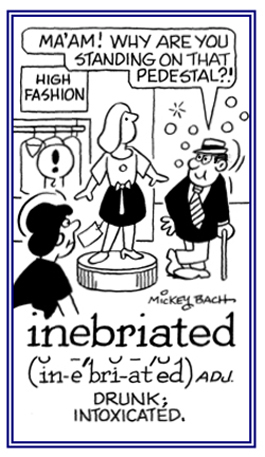inebriant
(in EE bree uhnt) (adjective), more inebriant, most inebriant
1. A reference to an intoxicant: Christine's friend added some rum to her tea to make a warm inebriant beverage.
2. Etymology: from Latin inebriare; in-, "intensive" + ebriare, "to intoxicate".
inebriate
(in EE bree ayt) (s) (noun), inebriates
(pl)
A habitual drunkard or an intoxicated person or people: The nightclub where Jack lived was a place, where as an inebriate, he got his usual over supply of beers and didn’t know when to stop drinking them.
inebriate
(in EE bruh ayt") (verb), inebriates; inebriated; inebriating
1. To make intemperate or unrestrained, to impair the mental and physical abilities of an individual: Jerry knew that the combination of his medicine and wine in the evening would cause him to inebriate; so, he stayed away from such strong drinks.
2. To exhilarate or to stupify with strong drinks: Mary’s parents avoided having any alcoholic beverages served during their daughter’s birthday party because some of the guests might inebriate by taking too many sips of wine and not being in control of themselves anymore.
3. Etymology: from Latin inebriatus; past participle of inebriare, in- + ebriare, "make drunk"; from ebrius, "drunk".
inebriated
(in EE bree ay tid) (adjective), more inebriated, most inebriated
Relating to someone or people who are very tipsy or have consumed an immoderate amount of liquor resulting in the loss of control over their mental and physical functions: An
inebriated individual is usually in a stuporous state because he or she has ingested an excessive amount of intoxicating substances and is often characterized by motor incoordination and slurred speech.
Tim and his wife were too inebriated to drive their car home; so, they called a taxi to pick them up.
The three men at the bar became steadily more inebriated during the evening until the owner made them leave so he could close his place.
 © ALL rights are reserved.
© ALL rights are reserved.
Go to this Word A Day Revisited Index
so you can see more of Mickey Bach's cartoons.
inebriation
(s) (noun), inebriations
(pl)
A brief or momentary state which is caused by the uncontrolled and excessive intake of liquor: One of the drinks that the visitors enjoyed at the opening ceremony for the new mayor, was a combination of juice and gin, which could lead to a state of inebriation or insobriety if any of them indulged in drinking too much of it.
inebriety
(in i BRI uh tee) (s) (noun), inebrieties
(pl)
The plight of being out of control because a person is under the influence of alcohol: Inebriety set in when two friends, who hadn’t seen each other in years, met at the local pub and enjoyed one beer after the next resulting in a predicament of not even knowing where they were!
Alcohol intoxication, a common condition also known as drunkenness, results from drinking an excessive amount of alcohol in drinks over a relatively short period of about 30 minutes to several hours.
Alcohol can cause acute poisoning, if taken in sufficiently large amounts, and it depresses the activity of the central nervous system (the brain and spinal cord), leading to the loss of normal mental and physical control.
Thus, a person may become "jocose, lachrymose, bellicose, or comatose" (cheerful, tearful, argumentative, or unconscious).
— Compiled from information located in
The American Medical Association, Home Medical Encyclopedia,
Volume One, A-H; Random House; New York; 1989; page 84.

